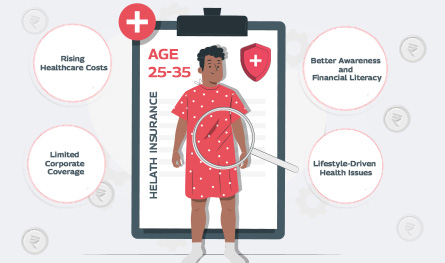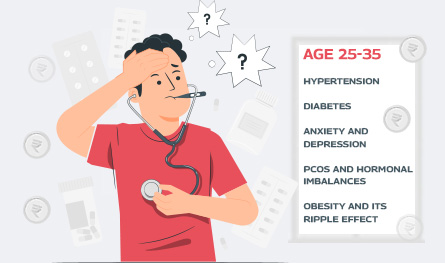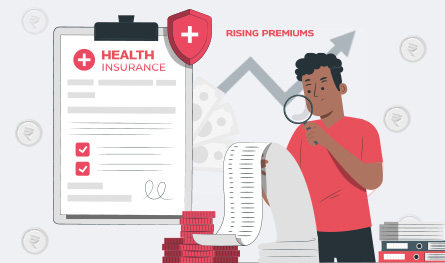What is better, Whole Life or Term Insurance?

If you’re planning to choose between a term life and a whole life insurance, this task is going to be tough. As Indians, we don’t generally understand the importance of life insurance coverage. Even if we do, the countless choices in the Indian insurance landscape end up overwhelming. However, an effective choice will depend on a range of factors. Your specific goals will highly affect what you pick for yourself.
Furthermore, both these plans can also largely vary depending on how much you wish to spend on an insurance plan. Besides goals, targets and the cost aspect, other factors will have to be taken into consideration before you can make the right choice about your preferred plan. If you are someone who wishes to opt for insurance plans sooner or later, this blog might help you out.

Key Differences Between Term and Whole Life Insurance
Since there are two broad categories that we can divide life insurance into, we must know what both mean.
1. Term Life Insurance
Term insurance, as its name suggests, is only to provide you coverage for a specific period. This means it will only cover you for a specific period. Now this can be 10 years, 20 years or 30 years. It all depends on the policy you are opting for. If during this time, the policyholder dies, the benefit will be transferred to their beneficiaries. While this is a more budget-friendly option out there, it only covers you for a specific period.
2. Whole Life Insurance
This is the kind of insurance policy that won’t just cover you for a certain decade or two. It will cover you for your entire lifetime. As long as you regularly pay your premiums on time, this insurance amount will be safe.
Moreover, this plan won’t just compensate you with death benefits. It also promises a cash value component. This means that such a plan can serve multiple purposes as you can withdraw the amount if you need it. This is good if you are not looking for any temporary fix and want something for long-term coverage.
The first step to knowing what plan to choose involves understanding the above two plans carefully. Life insurance riders can be integrated with both the above plans to widen their scope and improve coverage areas. You can be safeguarded against chronic health problems and accident death riders are available as well.
Cost Comparison: Term vs. Whole Life Insurance
1. Term Life Plans
There are perks and perils to both the plans. Term life plans involve lesser costs. Whole life plans can be a lot more expensive. So isn’t it a clear choice? What’s cheaper is always better. But this is not the case here. Both the plans are different from each other in terms of the features they promise.
A Term life plan can be great for a middle-aged person who has already spent half of his life and now wishes to have short-term coverage. By only spending a little money, they can get coverage that’s both affordable and effective. If you belong to the upper or lower middle class in India, this might be just right for you.
2. Whole Life Plans
Whole life plans are very different from the conditions of a term life cover. For starters, the basic difference is that they always come with a higher premium than term life policies do. But this accounts for something.
A higher premium also promises coverage for your entire life. Again, it’s also got the benefit of a cash value component that only increases over time and can serve multiple needs. This is an investment that can help you save more for future needs.
Most people who are just getting started are at the early stage of their life and career and are experiencing lesser financial stability often choose term life plans because of the affordability factor. But as time passes by, it will be wiser for you to either switch to a whole life insurance plan or to just opt for a hybrid plan instead that provides the best of both.
Benefits of Term and Whole Life Insurance
Have a lot of financial issues to deal with? Got children’s education to cover too? If you still have the desire to go for a life insurance plan despite these financial troubles, it might be a good idea for you to switch to a term life plan.
It is both effective and even provides you with the required coverage for the promised period. If you are at a critical stage of life where you cannot afford to go for a full-blown life insurance plan, know that term life insurance plans are both simple and affordable. There are no confusing clauses either!
But what if you’ve got the money and want to invest in something that can give you long-term life insurance coverage and returns too? No matter when the policyholder passes away, this plan will always cover the life insurance for the family.
And again, the cash value component also ensures that your loved ones will be financially covered all the time. If you get a retirement, or there’s an emergency or even if you want to grab investment opportunities, this cash value component can come in handy. No matter when this has a guaranteed payout and savings for your loved ones all the time.
In case of any critical illness or disability, you can also integrate insurance riders into both plans to expand the coverage to waive premiums or get additional payouts.
How to Transition From Term to Whole Life Insurance
While at first, you might want to go with whole life insurance, eventually, as your financial condition grows, you will require better coverage. If you can pay the premiums and affordability is not an issue anymore, this is possible. You just have to go through a procedure called ‘conversion’ to switch to a whole life plan. This way, you can avoid future medical assessments before opting for a whole-life plan.
Term life insurance promises better prices with temporary coverage. On the other hand, whole-life policies will give you coverage for an entire lifetime but with a higher premium.
Since term life insurance policies are only for temporary periods and offer no cash value component, naturally, they are cheaper.
With the conversion process, you can easily change to whole life plans when you feel your financial standing is better.
If the policyholder loses his life outside the term promised, then no payout will be offered for the same.
This is all about patience and long-term commitment. You’ll have to wait for the cash value component to acquire. Again, it’s not exactly inexpensive either. And the process can also be complex for some.
Yes. If you are in a financial position where you can afford to pay larger premiums and you want something for expanded coverage for your entire life, you can surely do this.

Author Bio
Paybima Team
Paybima is an Indian insurance aggregator on a mission to make insurance simple for people. Paybima is the Digital arm of the already established and trusted Mahindra Insurance Brokers Ltd., a reputed name in the insurance broking industry with 17 years of experience. Paybima promises you the easy-to-access online platform to buy insurance policies, and also extend their unrelented assistance with all your policy related queries and services.
Other Life Insurance Products
Latest Post

In what’s being called a quiet healthcare revolution, India’s young working professionals are reportedly making the most health insurance claims – outpacing even senior citizens. Surprised? So are the insurance providers. Young adults ranging between 25 and 35 years, who are often assumed to be in peak health, are now dominating the charts in health insurance claims by age.


If you think lifestyle-related health issues only show up after 40, think again. Youth no longer guarantees immunity. Today’s 25 - 35 age group is increasingly facing medical issues that only plague older adults. The reason? Long working hours at the desk, deliveries on speed dial, and a social life that rarely includes a decent amount of sleep are some of the reasons for the early onset of medical conditions like diabetes, anxiety, and hypertension.


Remember when a simple doctor’s visit felt like planning a mini-event? First, you had to book an appointment days ahead, then sit in a crowded waiting room, scrolling aimlessly while watching the clock tick past your slot. It's not exactly the highlight of anyone’s week. Well, those days are pretty much over. Enter telemedicine – the futuristic healthcare option that is slowly becoming the cornerstone of modern medical insurance plans. From coughs to consultations, you can now connect with a doctor from your living room or your office—or even mid-binge on your favourite series. It’s healthcare that works around your schedule, not the other way around.


Have you noticed how your routine visits to your doctor or a basic diagnostic test feel more expensive every year? Well, you’re not imagining it. Healthcare costs are rising faster than ever before, and unlike general inflation that affects groceries and fuel, medical inflation hits harder because it generally strikes during emergencies.


If you ever feel like your health insurance premium is slowly eating up a sizeable chunk of your pay stub every year, you are definitely not alone. With the rising costs of medical procedures and insurance companies adjusting to increasing claims and inflation, even basic health insurance coverage can start to feel like a financial burden.


